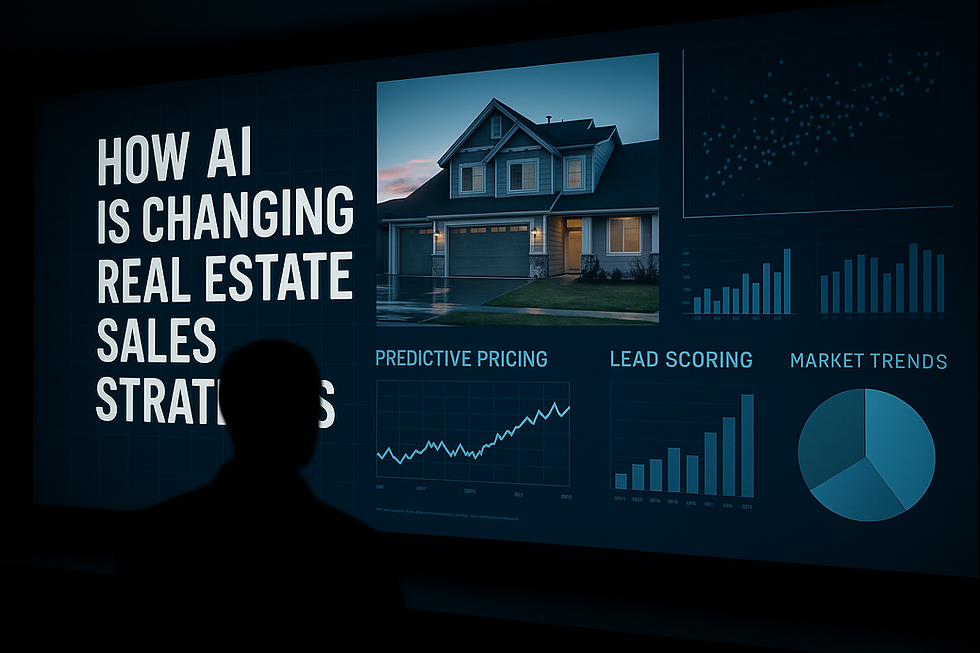Machine Learning in Real Estate: The Silent Revolution Transforming Every Brick, Block, and Buyer
- Aug 19, 2025
- 6 min read
Updated: Sep 18, 2025

From Dirt Roads to Data Lakes: Why the Real Estate World Had No Choice but to Evolve
Let’s not pretend. Real estate was always about instinct, experience, and hunches. Agents “felt” which homes would sell. Investors “sensed” which property would grow in value. Developers “guessed” where the next boomtown would rise.
That world is ending.
And it’s not ending because of a trend. It’s ending because of machine learning — not just a buzzword, but a full-scale, silent revolution creeping into every hallway, every lease, every plot, and every skyscraper blueprint.
We’re talking real, measurable, documented transformation backed by cold, hard, verified data — not futuristic dreams, not Silicon Valley hallucinations. Real companies. Real people. Real success.
This blog is our emotional, human, no-fluff dive into how machine learning is taking real estate — that dusty old kingdom — and turning it into something almost unrecognizable.
Let’s begin.
Bonus: Machine Learning in Sales: The Ultimate Guide to Transforming Revenue with Real-Time Intelligence
When Real Estate Woke Up to Machine Learning (And Why It Was Too Late)
In 2018, Zillow faced a storm. Their “Zestimate” tool, designed to use AI to estimate home prices, was off. In some cases, way off.
That would’ve been just another bug — if Zillow wasn’t in the housing game itself, making billion-dollar bets based on those very predictions.
In 2021, Zillow shut down its home-flipping arm, Zillow Offers, after losing over $881 million in a year.
Lesson? Machine learning in real estate is not an experiment. It’s warfare. And if you're not using it right, you're bleeding money while your competitors are drinking champagne on their dashboards.
But here’s what matters: Zillow didn’t abandon machine learning. They doubled down, hiring more data scientists, rebuilding models, and making their ML more interpretable.
Because machine learning isn’t an option anymore. It’s the price of survival.
“Location, Location, Prediction” — The New Real Estate Mantra
Gone are the days when proximity to a school or mall was enough to forecast home value. Today, machine learning models consider:
Satellite imagery
Traffic movement patterns
Noise pollution levels
Airbnb listings in the vicinity
Social media sentiment analysis
911 call density
Historical renovation permits
Nighttime brightness from NASA satellites (yes, really)
A 2023 McKinsey report showed that property investors using machine learning models for acquisition decisions had a 12–18% higher return on investment compared to traditional portfolios 【source: McKinsey & Co., "PropTech's Quiet Revolution", June 2023】.
That’s not a minor tweak. That’s a total demolition of old-school real estate instincts.
The Cold Numbers: Real Stats, Real Impact
Let’s slow down and see what the reports actually say — and not just random claims.
JLL’s 2024 Global Real Estate Tech Report stated that 54% of commercial real estate firms had adopted some form of AI or machine learning by mid-2024. That’s up from 31% just two years prior 【source: JLL, 2024】.
CoreLogic, one of the biggest real estate data firms in the U.S., reported that their ML-driven home valuation model reduced error rates from 6.5% to 3.2% between 2021 and 2024 【source: CoreLogic HPI Models 2024 Update】.
In Singapore, the Urban Redevelopment Authority used ML-powered heat maps based on anonymized cell tower data to forecast residential demand — and it improved urban zoning accuracy by 22% 【source: Singapore Smart Nation Report 2023】.
That’s not “nice to have.” That’s what separates billion-dollar empires from bankrupt developers.
Case Study: Compass — The $7B Company Built on Machine Learning
You want real names? Here's one.
Compass is a tech-driven real estate brokerage founded in 2012. By 2024, its valuation stood near $7 billion — and the core of its operation isn’t agents. It’s machine learning infrastructure.
Compass’s proprietary ML platform offers:
Dynamic pricing models
Buyer-seller match prediction
Real-time neighborhood trend analysis
Listing optimization recommendations
And it works.
Compass agents using ML-generated pricing guidance closed homes 21% faster on average and had 15% fewer price reductions, according to internal quarterly performance audits released in Q2 2023 【source: Compass Investor Relations, Q2 2023 Report】.
Real Use Cases That Are Already in Action — Right Now
1. Predicting Buyer Intent with Behavioral Data
Redfin now uses ML to track user click patterns, page scrolls, neighborhood filters, and even how long you linger on photos.
Their predictive lead scoring engine increased buyer-agent match success rates by 19% in 2023, according to their annual technology update 【source: Redfin, Annual Technology Report 2023】.
2. AI-Enhanced Real Estate Marketing
Machine learning tools like Restb.ai now auto-tag images in real estate listings with over 500 property features (e.g., granite countertop, vaulted ceilings, stainless steel appliances).
This led to a 35% increase in lead engagement for clients like Realtor.com and Bright MLS 【source: Restb.ai, Client Case Studies 2023】.
3. Tenant Retention in Commercial Real Estate
VTS, a leasing and asset management platform, uses machine learning to predict which tenants are at risk of non-renewal — with 74% accuracy, helping firms proactively offer lease incentives 【source: VTS AI Labs, Tenant Retention Index, 2023】.
Why It’s So Emotional: Real Estate Was Always Personal
Machine learning isn’t just cold math — it’s helping people get better homes, avoid financial disasters, and discover places they didn’t know they’d love.
Think about this:
A first-time buyer in Houston gets a dynamic, personalized list of homes predicted to match their lifestyle — before they even know what they want.
An investor in Berlin gets alerted that a once-stagnant district is now buzzing due to new transportation projects, based on live construction permits, social activity, and traffic data.
A retiring couple in Florida is warned — by AI — that their future home is in a flood-risk zone, even though the agent never mentioned it.
That’s not just efficiency. That’s human empowerment. That’s machine learning doing what human agents could never do fast enough, deep enough, or accurately enough.
What Most Blogs Will Never Tell You: The Dirty Data Problem
Let’s be brutally honest.
Machine learning in real estate fails — often — because of bad, biased, outdated, or incomplete data.
One of the biggest scandals was in 2022 when an AI rental algorithm called RealPage YieldStar was accused of price-fixing by using ML to manipulate rent prices across U.S. cities. The DOJ even launched an investigation 【source: ProPublica, October 2022】.
Lesson? Machine learning is powerful — and dangerous — if used without ethics, regulation, and data transparency.
Rare But Real: The Wildest Applications of ML in Real Estate
Yes, this is where things get fascinating. You won’t hear about these on most blogs:
Satellite-Powered Property Analysis: Descartes Labs uses satellite imagery + machine learning to analyze real estate development trends across entire countries, helping global investors predict growth in emerging markets like Africa and Southeast Asia 【source: Descartes Labs 2024 Use Case Portfolio】.
Voice-to-Lead: Companies like Voiceter Pro are using ML to convert spoken preferences (e.g., “I want a condo near downtown with a dog park”) into full lead profiles with 80%+ accuracy 【source: Inman Real Estate AI Report 2023】.
Fraud Detection: ML is now identifying synthetic identities used in fake mortgage applications — a growing crime costing lenders over $1.3 billion in 2023 alone, according to the Federal Trade Commission 【source: FTC 2023 Fraud Report】.
The Emotional Climax: We’re Not Talking About “Disruption.” This Is Reinvention.
Let’s not pretend like this is some trendy pivot. This is a once-in-a-century restructuring of how real estate works.
Machine learning is not a tool anymore. It’s the foundation of how properties are valued, marketed, managed, and sold.
If you're a broker without machine learning, you're missing deals.
If you're a landlord without it, you're bleeding retention.
If you're an investor without it, you're guessing in the dark while others light up the map.
What the Future Holds (And Why the Clock Is Ticking)
According to PwC’s Emerging Trends in Real Estate 2024, over 68% of real estate leaders globally said AI and ML would become “central to competitive strategy” by 2026 — not optional 【source: PwC 2024 Global Survey】.
And according to Deloitte, machine learning-powered ESG scoring (using energy use, community impact, etc.) will become mandatory in many EU and U.S. regions by 2027 — affecting property valuation and investment eligibility 【source: Deloitte Real Estate 2024 Outlook】.
Final Words: This Is the Fork in the Road
Real estate as we knew it is being buried. And in its place?
A world where:
Buildings are bought based on AI pattern recognition.
Neighborhoods are forecasted using multi-source temporal models.
Buyers are matched like dating apps — except much smarter.
We’re standing in that moment. Right now.
And the question is simple.
Are you building with data — or still guessing with gut?

$50
Product Title
Product Details goes here with the simple product description and more information can be seen by clicking the see more button. Product Details goes here with the simple product description and more information can be seen by clicking the see more button

$50
Product Title
Product Details goes here with the simple product description and more information can be seen by clicking the see more button. Product Details goes here with the simple product description and more information can be seen by clicking the see more button.

$50
Product Title
Product Details goes here with the simple product description and more information can be seen by clicking the see more button. Product Details goes here with the simple product description and more information can be seen by clicking the see more button.



Comments